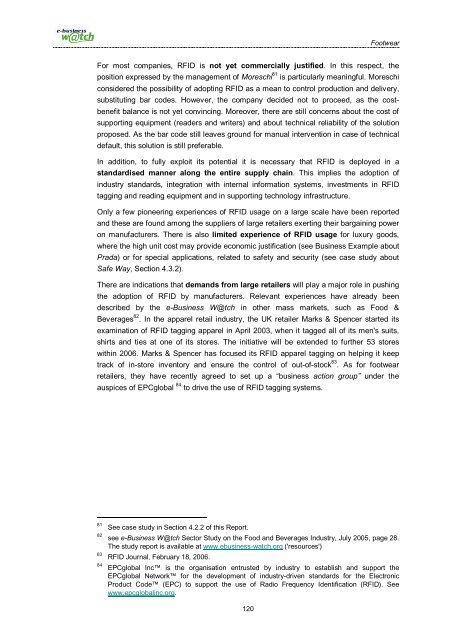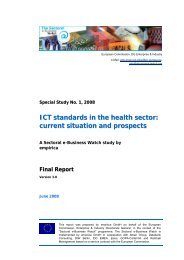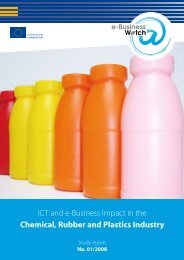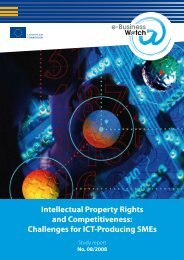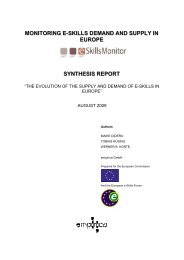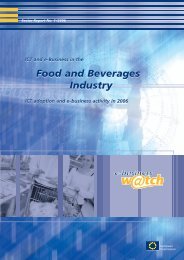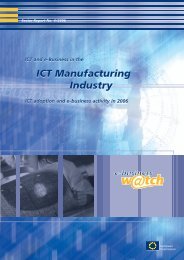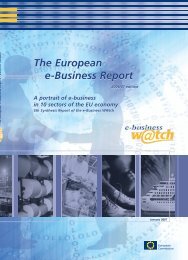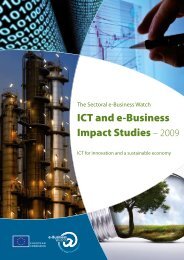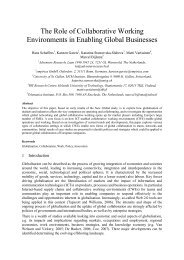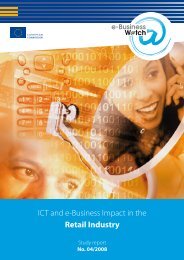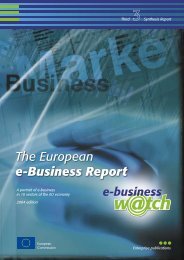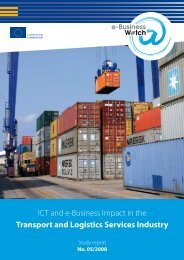Footwear Industry Footwear Industry - empirica
Footwear Industry Footwear Industry - empirica
Footwear Industry Footwear Industry - empirica
Create successful ePaper yourself
Turn your PDF publications into a flip-book with our unique Google optimized e-Paper software.
<strong>Footwear</strong><br />
For most companies, RFID is not yet commercially justified. In this respect, the<br />
position expressed by the management of Moreschi 81 is particularly meaningful. Moreschi<br />
considered the possibility of adopting RFID as a mean to control production and delivery,<br />
substituting bar codes. However, the company decided not to proceed, as the costbenefit<br />
balance is not yet convincing. Moreover, there are still concerns about the cost of<br />
supporting equipment (readers and writers) and about technical reliability of the solution<br />
proposed. As the bar code still leaves ground for manual intervention in case of technical<br />
default, this solution is still preferable.<br />
In addition, to fully exploit its potential it is necessary that RFID is deployed in a<br />
standardised manner along the entire supply chain. This implies the adoption of<br />
industry standards, integration with internal information systems, investments in RFID<br />
tagging and reading equipment and in supporting technology infrastructure.<br />
Only a few pioneering experiences of RFID usage on a large scale have been reported<br />
and these are found among the suppliers of large retailers exerting their bargaining power<br />
on manufacturers. There is also limited experience of RFID usage for luxury goods,<br />
where the high unit cost may provide economic justification (see Business Example about<br />
Prada) or for special applications, related to safety and security (see case study about<br />
Safe Way, Section 4.3.2).<br />
There are indications that demands from large retailers will play a major role in pushing<br />
the adoption of RFID by manufacturers. Relevant experiences have already been<br />
described by the e-Business W@tch in other mass markets, such as Food &<br />
Beverages 82 . In the apparel retail industry, the UK retailer Marks & Spencer started its<br />
examination of RFID tagging apparel in April 2003, when it tagged all of its men's suits,<br />
shirts and ties at one of its stores. The initiative will be extended to further 53 stores<br />
within 2006. Marks & Spencer has focused its RFID apparel tagging on helping it keep<br />
track of in-store inventory and ensure the control of out-of-stock 83 . As for footwear<br />
retailers, they have recently agreed to set up a “business action group” under the<br />
auspices of EPCglobal 84 to drive the use of RFID tagging systems.<br />
81<br />
82<br />
83<br />
84<br />
See case study in Section 4.2.2 of this Report.<br />
see e-Business W@tch Sector Study on the Food and Beverages <strong>Industry</strong>, July 2005, page 28.<br />
The study report is available at www.ebusiness-watch.org ('resources')<br />
RFID Journal, February 18, 2006.<br />
EPCglobal Inc is the organisation entrusted by industry to establish and support the<br />
EPCglobal Network for the development of industry-driven standards for the Electronic<br />
Product Code (EPC) to support the use of Radio Frequency Identification (RFID). See<br />
www.epcglobalinc.org.<br />
120


